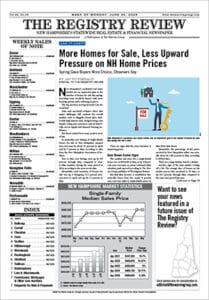
In the wake of high-profile bank failures, the nation’s banks appear to be facing deposit pressures, with larger regional banks likely to be subject to enhanced regulatory scrutiny. iStock image
Depositors have accelerated withdrawals amid recent bank failures and sharply rising interest rates, raising concerns about the industry’s health and ability to withstand a crisis, an expert says.
Bank deposits fell by nearly $720 billion between the second and fourth quarters of 2022, leaving banks’ cash assets at their lowest levels in more than two years earlier this month. Banks have been slow to pass along better interest rates on traditional accounts to consumers, prompting a shift to money market funds, government bonds or other more lucrative investments.
A new $300 billion special lending program the government made available following the failures of Silicon Valley Bank and Signature Bank has since helped slow the outflow.
Many smaller banks seemingly dipped into the package to boost their assets as a precaution.
“The size of the support suggests banks have a big hole in their finances,” said Brad McMillan, chief investment officer for Commonwealth Financial Network, in a note last month. “They now must fill that hole, which will mean fewer and more expensive loans across the economy.”
The Federal Reserve’s key overnight rate has risen to 4.75 percent to 5 percent, up from virtually zero at the start of last year. That’s prompted yields to rise on longer-term Treasurys and other bonds, reducing the value of the lower-yielding Treasurys that banks held. The run on Silicon Valley Bank resulted in its inability to raise enough cash from the sale of Treasurys to pay depositors who were trying to withdraw their money.
Wall Street remains concerned about how much more the system could get squeezed in the central bank’s fight against inflation, despite Fed reassurances that the U.S. banking system is “sound and resilient.”
Falling deposits at banks could result in lower returns on loans or higher costs for lending. That could ultimately result in less lending and could feed into a recession.
“Those tighter financial conditions mean we are looking at a recession that will be sooner and deeper than looked likely even two weeks ago,” McMillan said.
Broader worries about the banking sector have also raised the issue of whether current regulations are strict enough to prevent future failures and systemic risks. Michael Barr, vice chair for supervision at the Fed, was already conducting a review of requirements for bank capital when the latest bank failures hit in early March.
President Joe Biden recently called for independent regulatory agencies to impose tighter rules on the financial system, telling them that they can act under current law without additional steps taken by Congress.
Biden wants to revive and expand rules for mid-size banks that face less scrutiny than the industry’s behemoths, with administration officials saying that U.S. banks have stabilized since the collapse of Silicon Valley Bank on March 10 as it rolls out its recommended changes.
Once banks hold assets of more than $100 billion, the administration is asking them to hold more capital to absorb losses and face enhanced stress testing to ensure they could withstand a possible crisis. They would also need to provide the government with “living wills” to help them be unwound in case of failure.
In addition, Biden wants regulators to provide more aggressive supervision of banks and have them ensure that community banks are not responsible for replenishing the federal insurance fund for bank deposits.
Greg Baer, CEO of the Bank Policy Institute, criticized the administration’s proposals, saying it would impose costs on the economy as the bank failures are still being reviewed.
“This has a strong feeling of ready, fire, aim,” said Baer, whose advocacy group represents the financial sector.
Rob Nichols, president and CEO of the American Bankers Association, called the move “premature.”
But the Independent Community Bankers of America, a trade group for smaller community banks, praised an aspect of Biden’s move.
“ICBA strongly supports today’s White House announcement calling on the Federal Deposit Insurance Corp. to ensure community banks are not required to bear the costs of replenishing the Deposit Insurance Fund after recent failures at larger, riskier financial institutions,” CEO Rebeca Romero Rainey said in a statement. “As ICBA has said since the immediate aftermath of the Silicon Valley Bank failure, Washington’s response to recent closures at Silicon Valley Bank and Signature Bank of New York should not affect the community banks that continue to appropriately manage risk and do right by their customers.”

